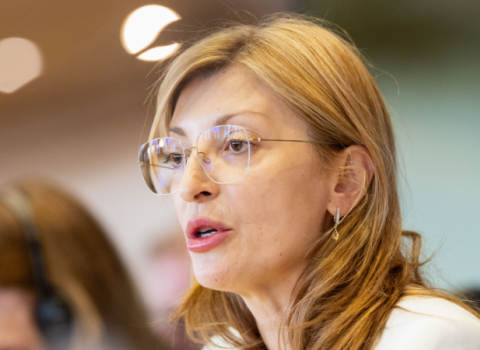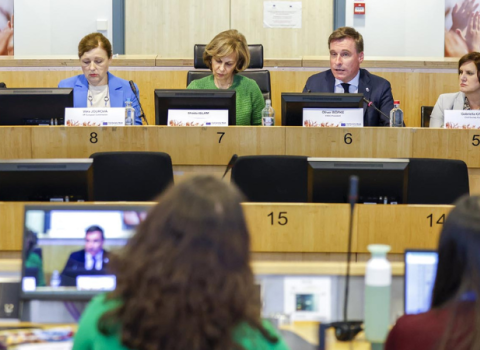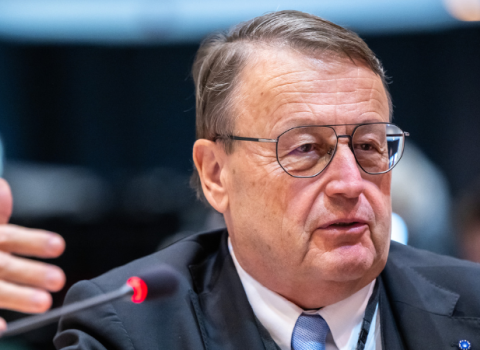At the opening of a big scientific convention last week in Dublin, Jules A. Hoffmann, a Nobel Prize-winning immunobiologist, handed the European Commission the strongest possible justification for its work in research – and a warning.
Hoffmann was co-discoverer of a fundamental mechanism of the immune system, the “Toll-like receptor.” His work began with a simple question: Why don’t grasshoppers get sick? It ended with a major discovery: They, fruit flies, humans and many other species share a common chemical system for defending against microbial infection – a system that has passed down to us through more than 450 million years of evolution, because it works.
His tale was a classic of scientific discovery – but also a European classic. Every step along the way, he said, there was a process of collaboration and learning with other researchers – often in entirely different fields – across Europe. His scientific voyage started in his home country of Luxembourg, moved across the border to Strasbourg, and then shifted to Stockholm, Paris, Tübingen, Basle, Nijmegan and many other cities (with a few stops along the way in the US) His was “predominantly a European journey”, he said, that required “inter-disciplinary research and collaboration between labs with complementary expertise.”
That kind of cross-fertilisation, Hoffman said, is essential to science – and “European institutions have been very helpful in fostering networking over the European Union.”
Insights and serendipity
For instance, an EU network of malaria researchers brought his group (which had been focusing on fruit flies) into contact with mosquito experts in Germany, Britain and southern Europe “with whom we would not have interacted spontaneously.” The two groups discovered they were looking at some of the same chemical pathways, and new insights arose from that serendipity. More generally, Hoffmann said, in many fields, “European Framework Programmes have undoubtedly had a beneficial impact by providing fresh funds and equipment, in a context of collaboration.”
In the audience, top EU officials were beaming. Research Commissioner Máire Geoghegan-Quinn, Chief Scientific Advisor Anne Glover, and scores of other Eurocrats who had flown into town for the event could not have scripted a better message if they tried: the EU works in science. Forget the Eurozone crisis. Forget German xenophobes, Greek fascists, British eurosceptics and Spanish bankruptcies. Forget endless arguments over farm subsidies, fish quotas, and development funds. There is at least one policy area in which a European perspective matters, and is thriving: Research.
Advancing the European Research Area
His words seemed tailor-made to set the stage for Geoghegan-Quinn’s next announcement this week when she got back to Brussels: Development of the so-called European Research Area. Her goal: To encourage changes in law, institution and practice that would make it even easier for researchers like Hoffmann to collaborate across borders, through a single EU market for ideas, inventions and researchers. Like every EU proposal, this one – which began as an idea 12 years ago – has hit opposition from national governments ever-suspicious of real or imagined power-grabs by Brussels. So having the support of a Nobel winner can’t hurt.
Even more impressive for the Euro-message, however, was the entire Dublin conference at which Hoffmann spoke, the Euroscience Open Forum. The event, a biennial science convention that this year drew 4,500 from across the EU, brought together every European language, scientific discipline and career stage from secondary school to professor emeritus. In more than 100 sessions over five days, they debated EU innovation policy, technology transfer, global warming, genetically modified organisms, satellite technology, string theory, the Higgs boson, the mathematics of music and (my own field) fractal geometry. In those – plus the hundreds of private lunches, dinners and scientific pub crawls that took place – the contours of a European-wide scientific community could be clearly seen. There is, it now appears, a European kind of science.
Confidence in Science
So it was a great show for the Eurocrats. But Hoffmann had a sting for them, also. “We started our research simply driven by curiosity,” he said, funded “modestly” by the French national research centre, CNRS. He was not, when granted the money, “asked to indicate which milestones we want to provide, within which pathways, what applications we were hoping to generate, what networking we wanted, or what industrial partners we had lined up. There was great confidence in science, and a global belief that whatever the field, any new discovery would inevitably have great benefit for society.”
The unspoken context: Even as the EU proposes a 46 per cent increase in its research funding, it is putting an ever-greater emphasis on economically-motivated innovation. That may suit the times, with reducing unemployment a greater political worry today than expanding the frontiers of knowledge – and Hoffman said we need both innovation and research. But his conclusion: “Our society should continue to support, in significant extent, research that is purely based on curiosity.”





 A unique international forum for public research organisations and companies to connect their external engagement with strategic interests around their R&D system.
A unique international forum for public research organisations and companies to connect their external engagement with strategic interests around their R&D system.